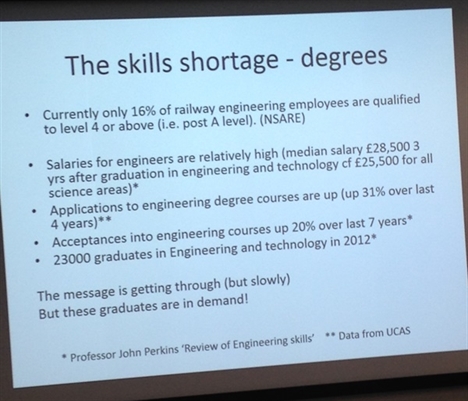16.10.14
Tackling the skills shortage in the rail industry
Professor Simon Iwnicki, chair of the IMechE Railway Division, has warned of the skills shortage in the rail industry as a result of the “renaissance” in rail and spike in passenger journeys – and described the measures to encourage more young people into engineering.
Iwnicki, Professor of Railway Engineering at the University of Huddersfield, has been speaking at the various regions of the IMechE Railway Division around the country, most recently last night in Manchester.
He said students considering their careers, even those already interested in engineering, can face a confusing and complex picture. “That’s one of the challenges for us: to clarify the different routes into railway engineering,” he told the audience of about 70 people, after speaking in Derby the night before. He explained the three Engineering Council registration categories and what is involved in achieving them: Chartered Engineer (CEng), Incorporated Engineer (IEng), and Engineering Technician (EngTech).
He celebrated the growth in passenger journeys and freight, saying the trend on the graph was as sharply upward as it was in the strongest era of growth during the Victorian era. “We’re really seeing a railway renaissance in passenger numbers, and it’s the same in freight. But that’s resulting in a skills shortage,” he said.
In engineering generally, it’s estimated that 87,000 new professional engineers are needed every year just to maintain the status quo, without considering new projects, but the industry is only bringing in 51,000. In rail engineering specifically, the problem is more acute, with a need for 3,100 highly-skilled engineers in a very short timeframe, and 1,500 in traction and rolling stock alone.
He said the trends look good in terms of applications to engineering courses, salaries and acceptances, and that there were 23,000 engineering and technical graduates in 2012. But at the degree level, railway engineering is not well-represented: there are 47 course providers for automotive engineering and 43 for aerospace engineering in the UK, Professor Iwnicki said – and just one course in railway engineering.
There is better provision of higher-level education, with a number of rail-related advanced courses around the country, plus the specialist courses at places like London South Bank University and the foundation course at Sheffield Hallam.
But, Iwnicki said: “If we’re not careful, young people when they’re choosing a degree will only think of railway engineering as a very vocational subject.”
That’s because too much of the advertising is still people (almost always men) wearing orange PPE holding spanners – which is not necessarily the best way to inspire younger people into the industry. “Our marketing needs to tackle that,” he added.
Other countries have entire universities dedicated to rail engineering, he said, and while he was not necessarily advocating that, he said there are certainly “lessons to learn”.

(Above: One of Professor Iwnicki's slides)
Apprenticeships are another important route into the industry, he noted: 66,000 students started an engineering apprenticeship in 2012-13, compared to the 27,000 who started a degree. He also praised initiatives like the Rail Training Academy at Northampton that’s being set up by Siemens and NSARE, and the new University Technical Colleges (UTCs), which were featured in the August/September 2014 edition of RTM. Iwnicki had recently visited Reading UTC, jointly sponsored by Network Rail and Microsoft, and praised the professional atmosphere and the attitude of the students. The government has also recently confirmed that the High Speed Rail College will be split between campuses at Birmingham and Doncaster.
RTM has also reported on the new rail engineering training centre developed by Newcastle College.
Iwnicki discussed the work of other organisations like the Smallpeice Trust, Routes into Rail, and the IMechE’s Railway Challenge, all of which have featured many times in RTM, as well as the summer schools put on at universities. RTM’s own UK Rail Industry Training Trust has also hosted the successful Gen Y Rail programme this year.
His speech also covered issues like continuing professional development (CPD) for rail engineers (and the lack of it, in some cases), plus the state of railway research.
Professor Iwnicki told the audience of IMechE members: “We need to encourage students to see railway engineering as the attractive, interesting, challenging, rewarding career that we all know it to be.”
Tell us what you think – have your say below or email [email protected]